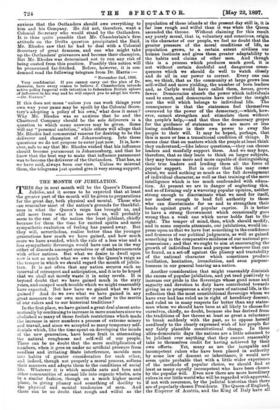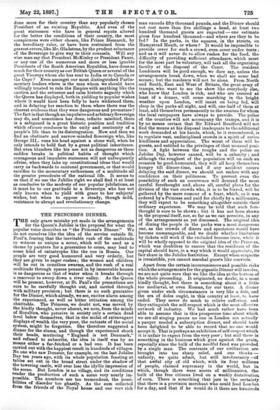THE MONTH OF JUBILATION.
THIS day in next month will be the Queen's Diamond Jubilee, and it seems to be expected that at least the greater part of the month will be given to preparations for the great day, both physical and mental. Those who can remember most of the nation's grounds for thankful- ness in what the Queen's reign has brought us, and still more from what it has saved us, will probably seem to the rest of the nation the least jubilant, chiefly because for them the time for excited spirits and mere sympathetic exaltation of feeling has passed away. But they will, nevertheless, realise better than the younger generations how much we have gained, and how much more we have avoided, which the rule of a less wise and a less sympathetic Sovereign would have cost us in the way either of discords amongst ourselves or of embarrassments with other nations. But what we desire to dwell upon now is not so much what we owe to the Queen's reign as the temper in which we should regard the month of jubila- tion. It is not often that any nation secures such an interval of retrospect and anticipation, and it is to be hoped that we shall not merely waste it in noisy revels. It is beyond doubt that we have gained much in the sixty years, and escaped much trouble which we might reasonably have expected. But how have we gained what we have gained ? And do we owe what we have gained in any great measure to our own merits or rather to the merits of our rulers and to our historical traditions ?
In the first place, we have gained a great deal almost auto- matically by continuing to increase in mere numbers since we abolished so many of those foolish restrictions which made the increase in mere numbers a process of extreme misery and travail, and since we accepted so many temporary self- denials which, like the time spent on developing the minds of the new generation, have borne fruit in attenuating the natural roughness and self-will of our people. There can be no doubt that the mere multiplication of numbers, when it goes on under no artificial pressure from needless and irritating State interference, moulds men into habits of greater consideration for each other, and indeed, though not properly a moral process, softens their manners and adapts them to the conditions of social life. Whatever it is which moulds ants and bees and other communities of animal life into organic wholes, acts in a similar fashion, though on a much higher moral plane, in giving pliancy and something of docility to the physical and mental tendencies of men. And there can be no doubt that rough and wilful as the population of these islands at the present day still is, it is far less rough and wilful than it was when the Queen ascended the throne. Without claiming for this result any purely moral, that is, voluntary and conscious, origin in the character of our people, we feel no doubt that the greater pressure of the moral conditions of life, as population grows, to a, certain extent civilises our human instincts and gives them greater adaptability to the habits and claims of other men. And though this is a process which produces much good, it is not without certain doubtful and dangerous conse- quences which we should do well to watch closely and do all in our power to correct. Every one can see, we think, that as the community at large grows less self-willed and more yielding, the number of born leaders and, as Carlyle would have called them, heroes, grows fewer. Democracies absorb the power which individuals used to exert, and democracies have neither the insight nor the will which belongs to individual life. The consequence is that the statesmen feel themselves overawed by the power of the democracy,—which, how- ever, cannot strengthen and stimulate them without the people's help,—and that thus the democracy gropes for the guidance of statesmen who are more or less losing confidence in their own power to sway the people to their will. It may be hoped, perhaps, that this is more or leas a transitional condition of things. It seems clear that on matters which the people at least think they understand,—like labour questions,—they can choose leaders and manfully support them. And we may hope, therefore, that as they learn to think on larger subjects, they may become more and more capable of distinguishing their true leaders and lending them all the force of popular support. But in order that this may come about, we need nothing so much as the full development of individual character, as well as that training of the mere intelligence which is too much confounded with educa- tion. At present we are in danger of neglecting this, and so of forming only a wavering popular opinion, neither strong enough to discriminate what we need for itself, nor modest enough to lend full authority to those who can discriminate for us and to strengthen their hands against gusts of popular caprice. It is better to have a strong Government which occasionally goes wrong than a weak one which never holds fast to the right. The temper of mind, then, which should modify, and in some respects attenuate, our jubilations, would im- press upon us that we have lost something in the confidence and firmness of our political judgments, as well as gained something in the comparative mildness of our national pre- possessions ; and that we ought to aim at encouraging the growth of individual force and purpose wherever that can be found, as a set-off against the pliancy and tractability of the national character which sometimes produce vacillation, hesitation, irresolution, and even purpose- lessness in our general bearing as a nation.
Another consideration that might reasonably diminish the excess of popular jubilation, and yet tend positively to increase our pride in the Sovereign whose good sense and sagacity and devotion to duty have contributed towards giving us so prosperous a sixty years of national life, is the reflection that the most constitutional Sovereign whom we have ever had has ruled us in right of hereditary descent, and ruled us in many respects far better than any states- man whom we should have been at all likely to choose for ourselves, chiefly, no doubt, because she has derived from the traditions of her throne at least as great a reluctance to break suddenly with the past, as to oppose herself needlessly to the clearly expressed wish of her people for any fairly plausible constitutional change. In these ultra-democratic days the nations are a little ashamed to be jubilant over anything that they cannot reasonably take to themselves credit for having achieved by their own efforts. Yet, many as are the incapable and incompetent rulers who have been placed in authority by some law of descent or inheritance, it would now seem quite probable that with a little wider experience of the methods of popular choice, we should find at least as many equally incompetent who have been chosen by the popular will. Even now there are more hereditary rulers in our little world who will be regarded with approval, if not with reverence, by the judicial historian than there are of popularly chosen Presidents. The Queen of England, the Emperor of Austria, and the King of Italy have all done more for their country than any popularly chosen President of an existing Republic. And even of the great statesmen who have in general repute altered for the better the conditions of their country, the most conspicuous were either chosen, like Prince Bismarck, by the hereditary ruler, or have been restrained from the gravest errors, like Mr. Gladstone, by the prudent reluctance of the Sovereign to give way to their counsels. Will any wise man say that President McKinley or President Faure, or auy one of the numerous and more or less ignoble Presidents of the South American Republics, have done as much for their country as our British Queen or several of the great Viceroys whom she has sent to India or to Canada or the Cape ? Even amongst our most distinguished Parlia- mentary leaders where is the man whom we should have willingly trusted to rule the Empire with anything like the caution and the reticence and calm historic sagacity which the Queen has displayed, both in yielding to popular wishes where it would have been folly to have withstood them, and in delaying her sanction to them where there was the clearest evidence that they were dangerous and premature ? The fact is that though an impulsive and arbitrary Sovereign may do, and sometimes has done, infinite mischief, there is a safeguard in a great historic position and tradition which oftener conduces to the unity and continuity of a people's life than to its disintegration. Now and then we find an obstinate and narrow-minded Sovereign who, like George Ill., runs his head against a stone wall, when he only intends to hold fast by a great political inheritance. But even blunders like his are not as dangerous as those sudden breaks in political habits of thought which courageous and impulsive statesmen will not unfrequently advise, when they take up constitutional ideas that would carry us backwards to cantonal government, or that would sacrifice to the momentary enthusiasm of a multitude all the greater precedents of-the national life. It seems to us that if we use the Jubilee right we shall find it at least as conducive to the modesty of our popular jubilations, as it must be to our gratitude to a Sovereign who has not only known when to yield with grace to her subjects' wishes, but when to oppose a, steady, though mild, resistance to abrupt and revolutionary change.







































 Previous page
Previous page